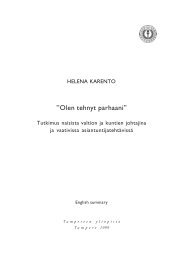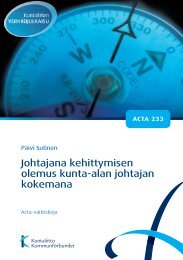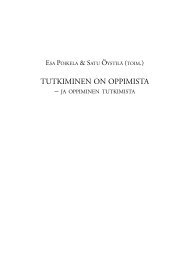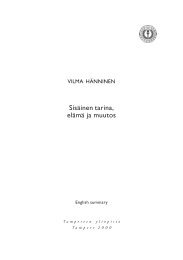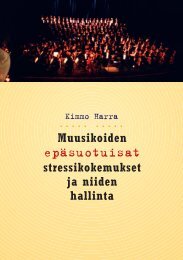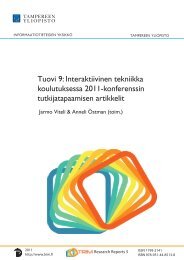Note on this edition: this is an electronic version of the 1999 book ...
Note on this edition: this is an electronic version of the 1999 book ...
Note on this edition: this is an electronic version of the 1999 book ...
Create successful ePaper yourself
Turn your PDF publications into a flip-book with our unique Google optimized e-Paper software.
56Dem<strong>on</strong>ic Texts <strong>an</strong>d Textual Dem<strong>on</strong>so<strong>the</strong>rs. Through self-reformati<strong>on</strong>, <strong>the</strong>rapy, techniques <strong>of</strong> body alterati<strong>on</strong>,<strong>an</strong>d <strong>the</strong> calculated reshaping <strong>of</strong> speech <strong>an</strong>d emoti<strong>on</strong>, we adjust ourselvesby me<strong>an</strong>s <strong>of</strong> <strong>the</strong> techniques propounded by <strong>the</strong> experts <strong>of</strong> <strong>the</strong> soul. Thegovernment <strong>of</strong> <strong>the</strong> soul depends up<strong>on</strong> our recogniti<strong>on</strong> <strong>of</strong> ourselves as ideally<strong>an</strong>d potentially certain sorts <strong>of</strong> pers<strong>on</strong>, <strong>the</strong> unease generated by <strong>an</strong>ormative judgement <strong>of</strong> what we are <strong>an</strong>d could become, <strong>an</strong>d <strong>the</strong> incitement<strong>of</strong>fered to overcome <strong>th<strong>is</strong></strong> d<strong>is</strong>crep<strong>an</strong>cy by following <strong>the</strong> advice <strong>of</strong> expertsin <strong>the</strong> m<strong>an</strong>agement <strong>of</strong> <strong>the</strong> self. 9Th<strong>is</strong> self has a close relati<strong>on</strong> with a particular way <strong>of</strong> thinking. GeorgeLak<strong>of</strong>f has named as objectiv<strong>is</strong>m <strong>the</strong> traditi<strong>on</strong> <strong>of</strong> thought that could as wellbe called “classical reas<strong>on</strong>” which holds that “c<strong>on</strong>ceptual categories are definedsolely by <strong>the</strong> shared essential properties <strong>of</strong> <strong>the</strong>ir members”; that“thought <strong>is</strong> <strong>the</strong> d<strong>is</strong>embodied m<strong>an</strong>ipulati<strong>on</strong> <strong>of</strong> abstract symbols”; <strong>an</strong>d that“those symbols get <strong>the</strong>ir me<strong>an</strong>ing solely by virtue <strong>of</strong> corresp<strong>on</strong>dences tothings in <strong>the</strong> world.” Lak<strong>of</strong>f adds that <strong>th<strong>is</strong></strong> “view <strong>of</strong> reas<strong>on</strong> as abstract, d<strong>is</strong>embodied,<strong>an</strong>d literal <strong>is</strong> well-establ<strong>is</strong>hed.” 10 One <strong>of</strong> <strong>the</strong> central c<strong>on</strong>sequences<strong>of</strong> <strong>the</strong> self being part <strong>of</strong> such a system, <strong>is</strong> that it has been perceived as <strong>an</strong> essential<strong>an</strong>d natural comp<strong>on</strong>ent <strong>of</strong> being. Our thought c<strong>on</strong>fr<strong>on</strong>ts problemswhen dealing with such experiences that do not properly fit <strong>th<strong>is</strong></strong> idea. Therati<strong>on</strong>al, fully aut<strong>on</strong>omous self <strong>is</strong> in fact a classical ideal, <strong>an</strong>d should be perceivedas <strong>an</strong> abstracti<strong>on</strong>, illustrating particular needs <strong>an</strong>d aims – or, a particularideology. The following comment from Ar<strong>is</strong>totle’s Politics clarifies <strong>th<strong>is</strong></strong>point:An immediate indicati<strong>on</strong> <strong>of</strong> <strong>th<strong>is</strong></strong> [natural order] <strong>is</strong> afforded by <strong>the</strong> soul,where we find natural ruler <strong>an</strong>d natural subject, whose virtues we regard asdifferent – <strong>on</strong>e being that <strong>of</strong> <strong>the</strong> rati<strong>on</strong>al element, <strong>the</strong> o<strong>the</strong>r <strong>of</strong> <strong>the</strong> n<strong>on</strong>rati<strong>on</strong>al.It <strong>is</strong> <strong>the</strong>refore clear that <strong>the</strong> same feature will be found in <strong>the</strong> o<strong>the</strong>rcases too, so that most inst<strong>an</strong>ces <strong>of</strong> ruling <strong>an</strong>d being ruled are natural. Forrule <strong>of</strong> free over slave, male over female, m<strong>an</strong> over boy, are all different,because, while parts <strong>of</strong> <strong>the</strong> soul are present in each case, <strong>the</strong> d<strong>is</strong>tributi<strong>on</strong> <strong>is</strong>different. Thus <strong>the</strong> deliberative faculty in <strong>the</strong> soul <strong>is</strong> not present at all in aslave; in a female it <strong>is</strong> present but ineffective, in a child present but undeveloped.11The subordinati<strong>on</strong> <strong>of</strong> emoti<strong>on</strong>s <strong>an</strong>d all o<strong>the</strong>r (“lower”) aspects <strong>of</strong> subjectivityto <strong>the</strong> rati<strong>on</strong>al self corresp<strong>on</strong>d to <strong>the</strong> subjugati<strong>on</strong> <strong>of</strong> slaves, women<strong>an</strong>d children by free men. The definiti<strong>on</strong> <strong>of</strong> subjectivity in terms <strong>of</strong> <strong>the</strong> rati<strong>on</strong>alsoul <strong>is</strong> a politically motivated fundamental in Ar<strong>is</strong>toteli<strong>an</strong> thought. It9 Ibid., 11.10 Lak<strong>of</strong>f 1987, 586.11Ar<strong>is</strong>totle 1981, 95 [1260a4-13]. – Ar<strong>is</strong>totle c<strong>an</strong>, <strong>of</strong> course, be approached from different<strong>an</strong>gles, <strong>an</strong>d h<strong>is</strong> <strong>the</strong>ories are open to m<strong>an</strong>y interpretati<strong>on</strong>s. For a recent defence <strong>of</strong>logos <strong>an</strong>d Ar<strong>is</strong>totle’s argument, see <strong>the</strong> interpretati<strong>on</strong> in Roochnik 1990, 23-45. See alsoDerrida’s article “The Supplement <strong>of</strong> Copula: Philosophy before Lingu<strong>is</strong>tics,” whichpoints out that Ar<strong>is</strong>totle’s Metaphysics <strong>an</strong>d h<strong>is</strong> categories c<strong>an</strong> be read as expressing awareness<strong>of</strong> <strong>the</strong> metaphoric quality <strong>of</strong> thought (Derrida 1972/1989).



